

For animals that live in small groups, the costs of having a big brain outweigh its benefits. This hypothesis was associated with data obtained from primate studies in the early 90s, but now, 20 years later, the image is more complicated. On the one hand, the number of primate species for which we have brain and group data has increased to 238. Although social factors still seem to play an important role for a subset of species, for others it is the ecological factors that have been driving the presence of the big brain. On the other hand, the hypothesis that the structure of the brain is modular has been discredited and can be seen more as a network computer that can solve problems. In this project, we continue the mathematical modeling of the social brain hypothesis, but with the vision of a more reactive social brain concept. In particular, we examine how the changing costs of creating and maintaining non-family social affiliations (having friends), as allowed by social networks and other digital technologies, affect the human capacity to process complex social problems.

SOCIAL PSYCHOLOGY
Tamas is part of the Social and Evolutionary Neuroscience Research Group (SENRG), Oxford Center run by Robin Dunbar and which studies human behavior. David-Barrett has a special interest in the synchronic dynamics of behavior and the impact of the evolutionary aspects in sociability, to understand them he uses tools from Big Data to neuroscience. In the original formulation of the social brain hypothesis (mid of the 1970s) a relationship between brain size and group size in primates was postulated. Today, this correlation is weaker and it is considered that it is necessary to look at social and ecological factors.
|
|
Tamas David-BarretPrincipal ResearcherPhD en Economía, Universidad de Londres. |
 |
Robin DunbarAntropólogo Evolucionista. Director SENRG, Universidad de Oxford.
|
PAPERS
APARICIONES EN PRENSA
|